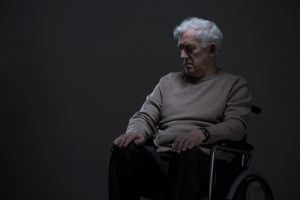Hallucinations and Delusions with Alzheimer’s and Dementia
 People with Alzheimer’s and dementia often suffer from hallucinations and delusions. This can be confusing and scary. It is important for the caregiver to understand what they are, why they are happening, and how they can help.
People with Alzheimer’s and dementia often suffer from hallucinations and delusions. This can be confusing and scary. It is important for the caregiver to understand what they are, why they are happening, and how they can help.
Hallucinations are sensory based. When someone is having a hallucination they are hearing, seeing, smelling, tasting, or even feeling things that do not exist. For instance, your loved one may see a dog on the patio, or children running around the house. They could be hearing voices, see faces, even have conversations with people who don’t exist.
Delusions are belief based. Delusions are what a person believes to be true. If your loved one is having delusions, they may believe that you are “out to get them”, that someone is stealing from them, or that there are strangers in their house.
As the caregiver, it is important to know the possible reasons why hallucinations and delusions are occurring. It is also a good idea to discuss these events with your loved one’s doctor.
Issues that could be contributing to hallucinations and delusions:
- Memory issues. As things start to get increasingly confusing and disorienting, many sufferers have delusions in order to create a narrative that helps them make sense of their world.
- Eyesight problems. Has there been a change in the overall vision of your loved one? Do they need new glasses? If so, this could be compounding the hallucinations and delusions associated with Alzheimer’s and dementia.
- Health issues. Sickness such as fever, and infections can contribute to hallucinating and delusions. Bigger health concerns such as stroke and seizure also can play a part.
- Medications can be a culprit and it is key to keep track of the medications they are on and discuss with their doctor any connections there may be.
- Basic needs aren’t meeting met. Do they have to go to the bathroom? Are they hungry? Do they have a stomachache or incontinence issue? Sometimes basic needs are a trigger for hallucinations and delusions.
When your loved one is experiencing a hallucination, especially a scary one, it is essential you offer calm, supportive, and loving help. Make sure they know you will be there to take care of them and keep them safe. Allow them to discuss what they see or believe. Don’t correct or contradict them. Agree that seeing that this could be scary, but they have nothing to fear. Let them know that they are ok and not alone.
Distractions are a good way to calm down a person suffering from hallucinations and delusions. Try an activity they enjoy. For instance, turn on some music and have a sing-along, or look through a photo album. If possible, go for a walk, gentle exercise is very important.
Your loved one’s living environment plays a big part of their hallucinations and delusion. Make note of a few key items:
- Is the TV on? Sometimes they can’t tell the difference between what they are seeing on TV and real life. Make sure nothing violent is on that could be scary.
- Do they see people or items they don’t recognize? Try covering the mirrors. Seeing images of people, even themselves, can be frightening. And reflection of other images can be very confusing.
- Are the lights on? Make sure rooms are lit to eliminate shadows and dark images.
- Are they alone in a room too long? Take them to a room with someone in it, this could help the hallucination subside.
- Is the living area safe from object that may hurt them or others? If they are scared or confused, they might mistakenly use something that could hurt themselves or others.
- Is there a particular object that causing constant stress? If your loved one is constantly having upset or hallucination because of a specific item, like a statue or plant, simply remove it from their living space.
Hallucinations and delusions are a common occurrence for people suffering for Alzheimer’s and dementia. With understanding and patience, a caregiver can provide tremendous relief and security to the loved one experiencing these scary events.
